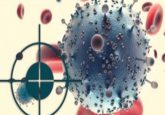Novel p53-targeting peptide could help treat ovarian cancer

Researchers from UCLA (CA, USA) have developed a potential new method for the treatment of ovarian tumors. Their work involved targeting p53, which is commonly mutated in high-grade serious ovarian cancer, and produced results that the team describe as “remarkable”. Details appeared recently in Cancer Cell.
In healthy tissues, p53 prevents damaged cells from reproducing, either by halting cell growth until the cell is repaired or by promoting cell death. However, mutations found in 96 % of women with high-grade serious ovarian cancer can cause p53 to aggregate, preventing its action. Damaged cells are therefore free to multiply, resulting in cancer.
Over the course of 3 years, the UCLA team developed a peptide termed ReACp53, designed to penetrate cancer cells and prevent p53 aggregation. This approach restores normal p53 function, resulting in the death of ovarian cancer cells. The researchers reported that the method did not cause any obvious side effects in a physiological model and that the peptide was well tolerated.
“Our lab has worked for 15 years on the protein aggregates that cause amyloid diseases such as Alzheimer’s and Parkinson’s disease,” explained David Eisenberg (UCLA Jonsson Comprehensive Cancer Center). “These aggregates are organized as fibers that are 500 times smaller than the width of a hair, which is quite a challenge.”
“This approach was originally developed for neurodegenerative diseases and we are now applying it to cancer therapy,” continued investigator Alice Soragni (the UCLA-DOE Institute). “We identified the sticky segments of p53 that cause the protein to clump by using a computer algorithm, determined their structure and then designed ReACp53 to block this process. This can keep the protein from clumping so it can do its job and kill cancer cells.”
At the time of diagnosis, high-grade serious ovarian cancer is often advanced and difficult to treat. Additionally, over 80 % of patients experience disease relapse after surgeries and chemotherapy.
Not only could this new treatment prevent future relapses, it could also lead to targeted treatments for other types of cancers with similar p53 mutations. “The results were remarkable, with significant shrinkage in patient-derived tumors,” concluded Sanaz Memarzadeh (UCLA Jonsson Comprehensive Cancer Center).
Source: UCLA press release



